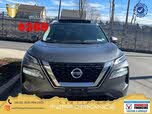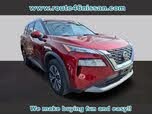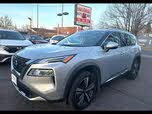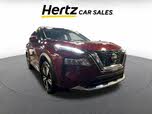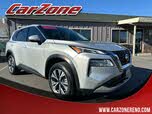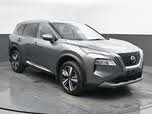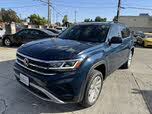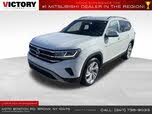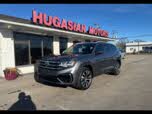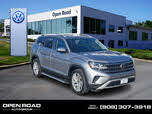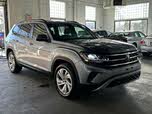2021 Nissan Rogue vs 2021 Volkswagen Atlas
Overview | ||
MSRP | $31,545 | $26,050 |
Average price | $26,019 | $21,997 |
Listings | ||
Ratings & Reviews | ||
User reviews | ||
Expert reviews | 6.5 out of 10Read full review | 9.0 out of 10Read full review |
Pros & cons | Pros
| Pros
|
Summary | Introduced for the 2018 model year, the Atlas is Volkswagen's latest attempt to win over American buyers. Built in Chattanooga, Tennessee, the VW Atlas competes in the three-row crossover SUV segment against well-established nameplates like the Ford Explorer, Honda Pilot, and Toyota Highlander. Changes for 2021 are limited to exterior styling tweaks and a reshuffled option list. VW also offers the two-row Atlas Cross Sport. | To characterize the all-new 2021 Nissan Rogue as vital to the automaker's success is an understatement. Not only is the compact crossover SUV the best-selling Nissan in America, but it's also one of the best-selling vehicles in America. Strip out pickup trucks, and the Rogue sits near the top of the U.S. sales chart with its primary competitors, the Honda CR-V and Toyota RAV4. Imagine the pressure on Nissan designers, engineers, and product planners as they prepared the current Rogue's replacement! The good news is that the new Rogue is a better SUV in every way but one. |
Video | ||
Popular Features & Specs | ||
Engine | 2.0L 235 hp I4 | 2.5L 181 hp I4 |
Drive Train | FWD | FWD |
Seating Capacity | 7 | 5 |
Horsepower | 181 hp @ 6000 rpm | |
MPG City | 21 | 27 |
MPG Highway | 24 | 35 |
Engine | ||
Engine Name | 2.0L 235 hp I4 | 2.5L 181 hp I4 |
Torque | 181 lb-ft @ 3600 rpm | |
Horsepower | 181 hp @ 6000 rpm | |
Drivetrain | FWD | FWD |
Fuel Economy | ||
MPG City | 21 | 27 |
MPG Highway | 24 | 35 |
Interior | ||
Seating Capacity | 7 | 5 |
Safety | ||
Front Crash Overall | 4 | 3 |
Side Crash Overall | 5 | 5 |
Dimensions & Capacity | ||
Cargo Space | 20.6 cu ft | 31.6 cu ft |
Curb Weight | 4248 lbs | 3371 lbs |
Height | 70.1 in | 66.5 in |
Length | 200.7 in | 183.0 in |
Width | 78.4 in | 72.4 in |
Wheelbase | 117.3 in | 106.5 in |
Maximum Payload | 1080 lbs | 1115 lbs |
Number of doors | 4 | 4 |
Maximum Towing Capacity | 2000 lbs | |
The 2021 Volkswagen Atlas had undergone a styling refresh, featuring new front and rear bumpers, redesigned LED headlights and taillights, and a new grille borrowed from its sibling, the two-row Atlas Cross Sport model. These updates added 2.4 inches to its length, giving it a bolder and more extroverted appearance than its more conservatively designed 2020 predecessor. Despite the upscale look, the Atlas faltered with its fake chrome exhaust tips, which were widely regarded as somewhat tacky. The R-Line trim package contributed sportier front and rear bumpers and side skirts, which accentuated the vehicle's more aggressive aesthetic. The Atlas' pragmatic MQB platform remained unchanged, but its cosmetic improvements were evident in enhanced exterior length and visual appeal.
In contrast, the 2021 Nissan Rogue adopted a more technical and SUV-like appearance with handsome new styling. Dark gray plastic cladding around the lower perimeter, bold simulated skid plates, and lower door protection provided a rugged flair, though perhaps it was too aggressive on the back bumper. The Rogue’s clean LED lighting elements, prominent V-Motion grille, and proper proportioning lent it a modern and visually pleasing aesthetic. Higher trims sported up to 19-inch aluminum wheels and optional two-tone paint with a black roof, giving it a custom look. The overall appearance of the new Rogue suggested a blend of rugged functionality and contemporary style.
The 2021 Volkswagen Atlas offered two engine options. The standard 2.0-liter turbocharged inline-four from the EA888 family produced 235 horsepower and 258 lb-ft of torque using premium fuel. A more potent 3.6-liter VR6 engine—with a unique narrow “V” angle—was available on higher trims, producing 276 hp and 266 lb-ft of torque. Both engines were paired with an eight-speed automatic transmission and came with either standard front-wheel drive or optional 4Motion all-wheel drive. The 4Motion system typically operated in front-wheel drive to enhance fuel efficiency but could transfer power to the rear wheels when necessary.
In real-world driving, the base 2.0-liter engine with AWD offered adequate but unremarkable acceleration, with rough gear shifts and a truck-like handling feel. The Atlas' multilink independent rear suspension did not suffice to deliver a smooth ride, and the suspension tuning seemed off, contributing to poor ride quality that was felt throughout the cabin. Off-road capability, while advertised, was limited, and it lacked low-range 4WD, making it best suited for pavement.
In comparison, the 2021 Nissan Rogue was equipped with a 2.5-liter four-cylinder engine producing 181 horsepower and 181 lb-ft of torque. This engine paired with a continuously variable transmission (CVT), which offered a smooth and barely noticeable driving experience owing to programmed ratios that mimicked a traditional automatic. Despite being underpowered for its nearly 3,500-pound weight, the Rogue's AWD version, coupled with up to 8.2 inches of ground clearance and new driving modes such as Snow and Off-Road, made it more capable off-road than expected. The new Rogue's ride and handling were notable, thanks to its more robust architecture and finely-tuned suspension systems, providing a predictable and smooth driving experience. Its new steering system, transferring assist closer to the steering rack, significantly enhanced steering feel and responsiveness.
The 2021 Volkswagen Atlas was a three-row crossover aimed at families, offering 96.8 cubic feet of cargo space behind the front seats and 20.6 cubic feet with all seats up. These figures placed it about average in its segment. Its exceptional third-row legroom came at the cost of limited and uncomfortable second-row space, which sported flat and thin cushions. Third-row access was convenient due to a sliding second-row bench, although it couldn’t match the ease of minivan sliding doors.
Control placement in the Atlas was driver-friendly, and it featured up to five USB ports and an optional wireless charging pad. With up to 17 cupholders, the Atlas nearly matched the Subaru Ascent's impressive 19-cupholder feat, averaging to about 2.4 beverages per person. Forward visibility, however, wasn't optimal, with standard ultrasonic parking sensors and optional low-speed automatic braking and active park assist enhancing parking convenience.
On the flip side, the 2021 Nissan Rogue featured enhanced comfort with improved Zero Gravity seats, now roomier and more supportive. They progressed from cloth in the S trim to premium quilted leather in the Platinum trim, with various power adjustments, heating options, and climate controls available depending on the trim level. The rear seats were spacious, offering generous headroom and legroom, and the rear doors opened nearly 90 degrees for easy passenger loading. Cargo capacity ranged from 31.6 cubic feet in the S and SV trims to 36.5 cubic feet in the SL and Platinum trims, thanks to the Divide-N-Hide cargo management system. With the rear seats folded down, the Rogue offered a maximum of 74.1 cubic feet, making it one of the roomiest in its class.
In the technology department, the 2021 Volkswagen Atlas came standard with Bluetooth and Apple CarPlay/Android Auto compatibility. The base model featured a 6.5-inch touchscreen with higher trims getting an 8-inch screen. The Digital Cockpit, available on higher trims, replaced analog gauges with a 10.3-inch reconfigurable digital display. The Atlas was set to receive the new MIBIII infotainment system later in the model year, promising multi-phone pairing, improved voice recognition, and a revamped navigation system. While the SE with Technology model had an 8-inch screen, it felt plain and text-heavy. The base six-speaker audio system was decent, with an optional 12-speaker Fender audio system available on higher trims. Additionally, a new 4G LTE WiFi hotspot could support up to four devices, with service provided by Verizon.
The 2021 Nissan Rogue, meanwhile, offered a competitive infotainment package starting with an 8-inch touchscreen, Bluetooth, SiriusXM satellite radio, Apple CarPlay, and Android Auto on the base S trim. Higher trims added NissanConnect Services, WiFi hotspot, and Amazon Alexa and Google Assistant integration. The SL Premium Package and Platinum trims further enhanced the system with a 9-inch touchscreen, door-to-door navigation, wireless Apple CarPlay, an upgraded voice recognition system, and a Bose premium audio system. Technologies like wireless smartphone charging, a 12.3-inch digital instrument cluster, and a 10.8-inch head-up display were exclusive to the Platinum trim, making the Rogue technologically advanced and user-friendly.
In terms of safety, the 2021 Volkswagen Atlas received "good" ratings in all IIHS crash tests but got a “marginal” rating for its child-seat anchors and mixed headlight ratings. While the standard headlights were rated “marginal,” the upgraded ones on the SEL and SEL Premium trims were rated “good.” NHTSA ratings for the 2021 model were yet to be published, but the 2020 Atlas scored five stars overall. Standard safety features included automatic emergency braking and blind-spot monitoring. Higher trims added adaptive cruise control and lane-keep assist, with upcoming updates promising Travel Assist and Emergency Assist features.
The 2021 Nissan Rogue emphasized safety with its comprehensive Nissan Safety Shield 360 package, which included features like automatic emergency braking with pedestrian detection and blind-spot warning with rear cross-traffic alert—prioritizing blind-spot monitoring over the traditionally included adaptive cruise control. Additional safety equipment included ten airbags, a driver monitoring system, and a rear-seat reminder. Higher trims gained advanced ProPilot Assist technology with lane centering and Navi-link, which adjusted speed based on navigation data. While specific crash-test results were pending, the Rogue's updated construction and emphasis on safety bode well for its crash protection performance.
CarGurus highlights
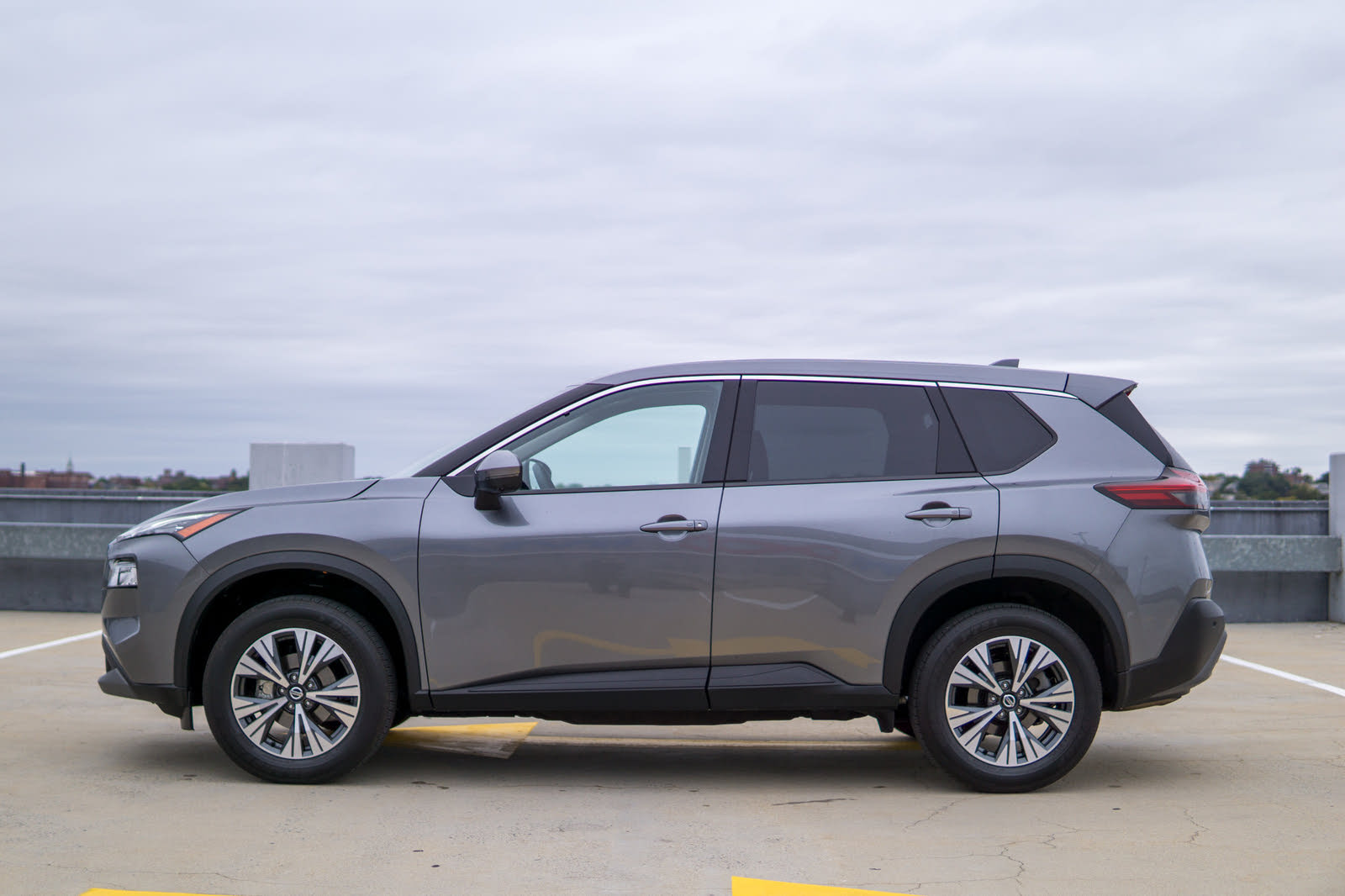
According to CarGurus experts, the overall rating for the 2021 Volkswagen Atlas is 6.5 out of 10, while the 2021 Nissan Rogue scores 9 out of 10. Given these ratings, the 2021 Nissan Rogue clearly emerges as the superior choice. Its blend of improved engine performance, excellent comfort, advanced technology, and comprehensive safety features make it a standout in the compact SUV segment. For those seeking a reliable, stylish, and tech-savvy family vehicle, the 2021 Nissan Rogue appears to be the better investment.
Choose the 2021 Nissan Rogue if:
Shop Now- You seek a comfortable, technologically-advanced cabin with Zero Gravity seats and premium materials.
- You prioritize advanced safety features and comprehensive driver-assistance systems.
- You need a flexible cargo management system with competitive cargo space, plus superior ride comfort and steering feel.
Choose the 2021 Volkswagen Atlas if:
Shop Now- You require a three-row crossover with substantial third-row legroom.
- You value a driver-focused layout with plenty of USB ports and cupholders.
- You need a vehicle with a towing capacity of up to 5,000 pounds with the VR6 engine.

By: CarGurus + AI
At CarGurus, our team of experienced automotive writers remain at the heart of our content operation, conducting hands-on car tests and writing insightful guides that are backed by years of industry experience. To complement this, we are harnessing AI to make our content offering more diverse and more helpful to shoppers than ever. To achieve this, our AI systems are based exclusively on CarGurus content, ratings and data, so that what we produce is both unique to CarGurus, and uniquely helpful to car shoppers.





















